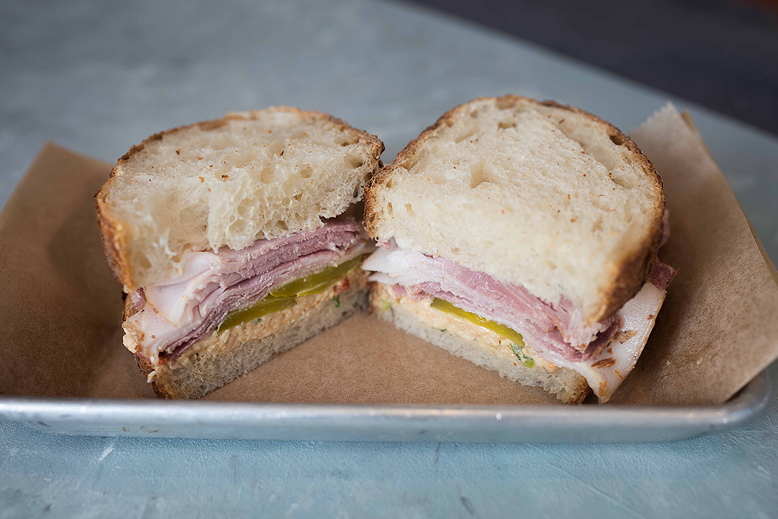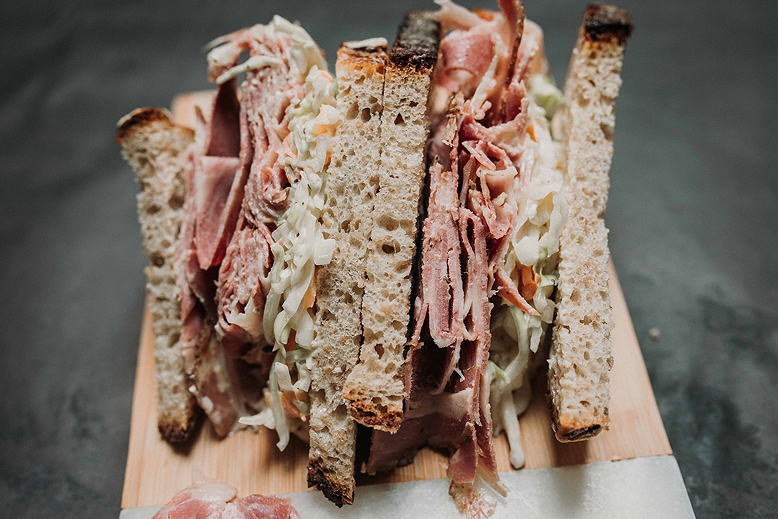
When Will and Erica Messmer ended up in downtown Jersey City, burnt out from nine-to-five office jobs in Manhattan and eager to open a food business of some sort, a butcher shop was not the obvious choice.
But as the couple discussed possibilities—from a Southern-style eatery in Copenhagen to a bed and breakfast in Portland, Maine to heading back to Erica’s hometown in Huntsville, Alabama—over home-cooked meals, they realized they hadn’t been able to find a place for quality meats in the neighborhood. There was an independent cheese shop, a seafood stand and a plethora of farmers markets, but nowhere for choosy and environmentally conscious shoppers to buy locally sourced, responsibly raised meat.

Erica and Will Messmer. Photo courtesy of Darke Pines
Will, the grandson of a butcher, started working on a business plan, visiting butcher shops and researching farms. Soon after, he left the corporate world and the couple started a Kickstarter campaign for Darke Pines, which opened in April 2018. Named for the town in Ohio where Will’s grandparents retired, Darke Pines is now where the Messmers, and their team of butchers and cooks, sell grass-fed, hormone- and- antibiotic-free beef and lamb, pastured pork and free-range poultry from small, local farms.
Versus butcher shops that exclusively buy and sell popular cuts like a rib-eye steak or lamb chop, Darke Pines’ aim is to use the entire animal, or as much of it as possible, Will says. At the sleek shop, with its whitewashed brick walls and rustic wooden accents (a far cry from a fluorescent-lit supermarket meat counter), using the entire animal speaks to the couple’s, and consumers’, “growing concern around climate change and environment and how meat fits into that,” says Will. “We provide customers the opportunity to buy meat they can feel good about, so they don’t have to buy four chicken breasts wrapped in plastic and Styrofoam. They can buy one and we can tell them where it was sourced, how it was raised and be totally transparent about it,” he explains.
“There’s not a lot of whole animal butchers anymore,” Erica adds. “But it’s really a craft,” and, she says, a better way to shop and consume, connecting people to farmers.
“Doing justice to the animal by using as much of it as we can,” including trying to sell lesser-known or less popular cuts—in addition to steaks, chops and roasts—requires some creativity, Will admits. Luckily for them, when the Messmers got into their more than 2,000-square-foot space, a former music venue they mostly renovated themselves, it came with a sizeable kitchen.
Read more about whole-animal butchery in NJ:
At the Pastoral Pig, Carving Meat is an Art Form
And luckily for locals, this has spawned cases of ready-to-eat prepared foods, frozen soups and stews and, recently, a growing menu of hearty sandwiches. Extra cuts of beef have become the popular meatballs with marinara sauce ($11.99), for example, while trying to make use of organs, a tough sell for home cooks, created the bestselling chicken liver mousse and a duck pâté ($12.99), great on a cheese plate; Bones and scraps, often throwaways, became bases for bone broths and stocks ($6.99 to $12.99), gumbos and chicken soup ($15.99), available in the shop’s freezer case. They even sell goods for canine diners, with raw dog food ($9.99/quart) and bones.
There are burger blends (short rib brisket has been a summer phenom, Will says; $14.99 a pound) and sausages (from Italian to lamb merguez to breakfast varieties, $12.99 to $13.99 a pound), plus housemade deli meats—roast beef, guanciale, smoked pastrami, smoked ham and smoked bacon ($13.99 to $15.99 a pound).
Darke Pines also offers what’s probably the neighborhood’s best-kept lunch secret: the sandwich menu, which launched this past spring. The simple but solid selection, Erica’s domain, includes options like smoked ham with pimento cheese and dill pickles; roast beef with horseradish cream, braised shallots and fresh basil; chicken salad with red grapes and romaine; pastrami with coleslaw and Swiss cheese; and mortadella with pickled mustard seeds and cornichons—all are stacked high, tucked into Balthazar bread and cost $10.
Sandwich fixings, from the chicken salad (Erica’s grandmother’s recipe) to the tangy pickled mustard seeds to the rich, juicy braised shallots, have become so popular they’ve also migrated to the prepared foods case ($8.99 for a jar of mustard seeds, $6.99 for a container of shallots), Will says, joining grilling accoutrements such as rolls, the preservative-free house barbecue sauce ($10.99) and a selection of local goods, from seasonal produce to hot sauce to gourmet spreads and spice blends.
Yet even with all these options for quicker bites, customers seek advice on how to master their meals at home. The Messmers and their team—head butcher Giancarlo Sbarbaro, production lead Caroline Phillipuk, butcher Ted Rosen and apprentice butcher T. Jay Macek—say they’re happy to dole out cooking and preparation advice. For those in search of a more formal education, once a month Darke Pines hosts monthly butchering “classes,” more of a demonstration where a butcher will break down beef or pork and explain the different cuts while another team member cooks for attendees. Besides a tasting, Will says the classes give people a “holistic look—a sense of the work and effort that goes into this stuff, from information about the farms to taking care of your knives.” (A beef class costs $115, pork is $95.)
The Messmers are planning on renovating, adding seating, and maybe coffee, pastries and breakfast foods, plus teaching more classes and expanding their catering offerings. And if word keeps getting out, definitely making more sandwiches.


